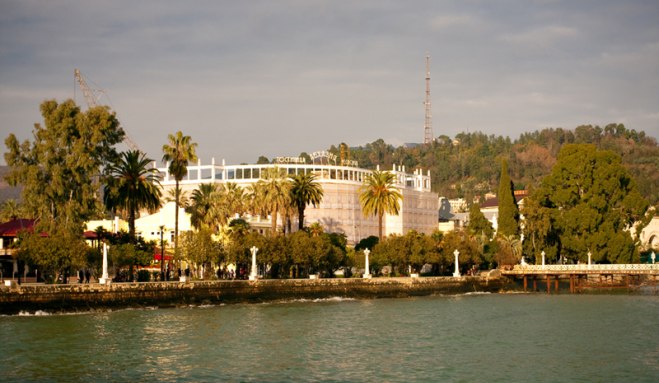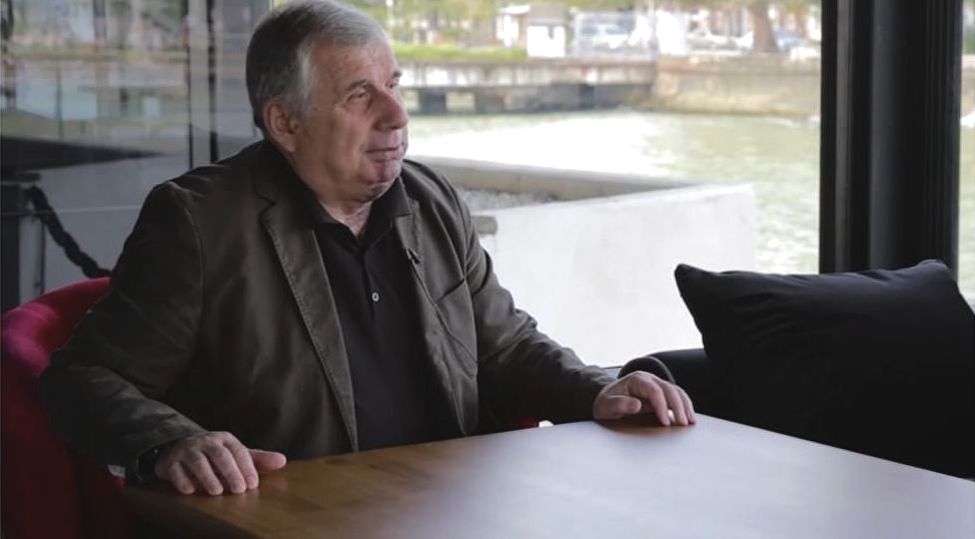Stanislav Lakoba - about "white spots" in the history of Abkhazia of the last century

This year the famous Abkhazian historian Stanislav Lakoba has published three books from the series “Unknown Abkhazia. XXth Century ". He spoke about one of them, where the story is told about the Abkhazian scholarly community destroyed by the authorities in 1931 for "historical counter-revolution".
This year in Sukhum the Academy of Sciences of Abkhazia, ABIGI [= Research Institute] and ASU [= Abkhazian State University] published a series of three books prepared by the famous Abkhazian historian and public and political figure Stanislav Lakoba. From one of them (viz. "From the window of the carriage", which presents the memoirs of Evgeniya Rafalskaya (1893-1988), who lived in Sukhum for many years) a number of quotes drawing vivid pictures of the customs and life of the people of Sukhum during the Great Patriotic War were cited by Echo of the Caucasus on 22 June, the day of the 80th anniversary of the beginning of that war.
As for the series of books as a whole, Stanislav Lakoba told Echo of the Caucasus about it :
“I decided to make such a series. And by the way (laughs), if I may say so, the pandemic played the main role here. Because I had to stay at home (in self-isolation), otherwise I probably would not have been able for a long time to find the time to get down to this work and put all these memories, these documents in order. The series is called: “Unknown Abkhazia. XXth Century".
We started talking about one of the books in this series "ABNO and its Defeat (1922-1931)". ABNO was an Abkhazian scholarly society, but even the well-educated representatives of today’s Abkhazia for the most part have not heard of the existence of such a society. By the way, it was the predecessor of the Abkhazian Research Institute of History, Language and Literature, as well as of the Abkhazian Institute of Humanitarian Research, which replaced it. Stanislav Lakoba remarked:

Stanislav Lakoba
“The question is actually very pertinent, because only specialists know about the Abkhazian scholarly society, i.e. about ABNO. And for a long time it was generally banned; there was even a fear to talk about it. I remember when one of the anniversaries of the Abkhazian Institute was celebrated, and, on the eve of this, I once said to Georgiy Alekseevich Dzidzaria (its Director), while in the corridor: ‘Georgiy Alekseevich, why, in fact, is it that we take the history of our scholarly society back to 1931 and not to 1922? After all, it was then that the Abkhazian Scientific Society, ABNO, was created?’ And you know, that's how it all worked then, subconsciously ... He looked around and said: ‘Well, why are you talking about this? What does ABNO have to do with the year 1922? No, no, we don't need to talk about it; we'll talk about it later somehow.’ And this was the attitude to it. So, in principle, the archival materials of the ABNO lay filed away, but, in principle, no one approached them. Very rarely, very rarely were they mentioned. And this is the top and bottom of how the book came out now... The more so, as almost all printed publications are presented there - and in many respects here, of course, Alexei Dbar, an employee of the Abkhazian Institute of Humanitarian Research, played a role, since he it was who carefully collected all of it. And, by the way, he is one of the founders of the information-site Apsnyteka, on which a huge amount of work that has been done, but, unfortunately, this is not much appreciated in our country. Financially no-one supports it; it was done thanks to the pure enthusiasm of one person."
In his introduction to the book, Stanislav Lakoba writes that before the revolution of 1917, there was not a single scholarly institution in Abkhazia, and only in the summer of 1922, on the basis of the Sukhum Agricultural Society that was in existence before, was ABNO created. At first it was located in the building where the ABIGI is now, and then in the building where the Abgosmuseum [= Abkhazian State Museum] is located now. The first chairman of the society was the Russified German statistician Heinrich Falbork, who moved to Abkhazia from Petrograd/Petersburg; in January 1923 he was replaced by the similarly Russified German ichthyologist German Barach (by the way, a former officer of the tsarist army). Falbork was transferred to the State Planning Committee of Abkhazia by the then-leader of Abkhazia, Nestor Lakoba, who actively helped to establish the work of the Society. From 1925 there was created in ABNO a section of Abkhaz studies headed by Simon Basaria. ABNO was a very authoritative scholarly organisation in the Transcaucasus. But in 1931 Herman Barach was arrested. Stanislav Lakoba says:
“Together with the archaeologist Ivashchenko — Mikhail Mikhailovich Ivashchenko was a very famous archaeologist — he was imprisoned in the Metekhi prison in Tbilisi. And here's what is surprising ... I cite a very interesting document in the book - this is the court-record of 23 September 1931. The most striking thing is that they were actually convicted of espionage and historical counter-revolution. Barach was forbidden from leaving Tiflis for three years and especially from going to Abkhazia. They were given work in Tiflis and told: ‘Work, but if you want to exist normally, you will remain here.’ Well, why espionage? — this is not clear. Maybe because the Abkhazian Scholarly Society maintained contacts with so many centres of scholarship — European, American... There were about 70 German centres. Beria then suggested to Barach in Tbilisi: ‘Either you work here, or you will die, but the way to Abkhazia is closed for you’."
Stanislav Lakoba first heard about ABNO as a schoolboy in 1969 from the famous archaeologist Lev Solovyev. In his book, he talks about how it was during excavations near Lake Amtkel, and quotes from the book of Yuri Voronov, who quotes Solovyev's story as follows: “Barach and Ivashchenko were taken to Tiflis, thrown into the Metekhi prison, and then they entered the cell known as The Benefactors who offered the prisoners housing and well-paid jobs in scholarly institutions in Tiflis. It is no coincidence that the ABNO pogrom coincided with the lowering of the political level of Abkhazia from its status as a full SSR to that of an Autonomy within the borders of Georgia."
This interview was published by Ekho Kavkaza, and is translated from Russian.